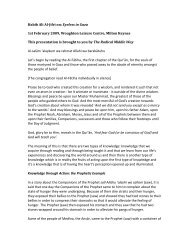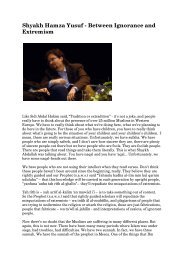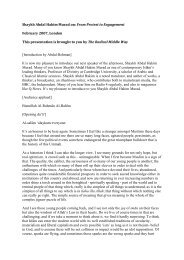PDF Transcription Shaykh Abdul Hakim Murad - Radical Middle Way
PDF Transcription Shaykh Abdul Hakim Murad - Radical Middle Way
PDF Transcription Shaykh Abdul Hakim Murad - Radical Middle Way
You also want an ePaper? Increase the reach of your titles
YUMPU automatically turns print PDFs into web optimized ePapers that Google loves.
will become fewer and its probably one of those markers of our times that whereas in<br />
the first few generations of Islam the „ulama were many and those who gave<br />
fatwas.were few. Today the „ulama, the real „ulama in a classical sense are few, but<br />
everybody is giving a fatwa. That‟s our condition. People convert to Islam and ten<br />
days later they are telling you well this group is not right and this view is not correct<br />
and this tafsīr has a problem, ma sha Allah. That‟s a sign of grave decadence. Now<br />
those people, when they look at the tree don‟t quite know what they are looking at<br />
because they haven‟t studied with gardeners who have been part of a tradition of<br />
maintaining that tree and its environment since it was planted. They don‟t know its<br />
ways and they can be lethally dangerous. And the most dangerous amongst them are<br />
those who say the tree at its most vigorous and its most promising and its freshest<br />
and its best when it was really young. If it‟s in trouble now, the branches are falling<br />
down, they need propping up and it‟s not what it was, then the obvious solution is to<br />
cut the tree down to ground level and it will be as good as new. Cut the tree down and<br />
you go back to a time when Islam was new or when the sultan planted it in the<br />
company of his spiritual guide in 1453.<br />
That‟s the mark of the non-„ālim, who thinks he understands the process of ijtihād.<br />
We need renewal, every Muslim accepts that. The religion has become old, doddery,<br />
cantankerous. The sole source of renewal is that which was good for the earliest<br />
generations of this ummah, that‟s established, nobody will deny it. But the difference<br />
between „ālim the and the amateur is that the „ālim says we‟ll deal with the tree as it<br />
is, we keep it going, alhamdulillahwe still have it and over the years it has acquired a<br />
certain magnificence, that in itself has the right to be respected and enjoyed. The<br />
amateur scholar says no, the best thing is to cut it down and well be back in 1453<br />
again, or indeed back at the time of the hijra, in the time of the prophet (SAWS). This<br />
is really what is at stake. We have a tree that is more intact than the trees of the other<br />
ummahs. But we have, given the nature of the age, an increasing proliferation of<br />
people who misunderstand it; who are not grateful for it, who can‟t see its current<br />
beauty, who have not trained with those who have been looking after it, and think<br />
that the solution is actually to cut it down. The great calamity in our age is not that<br />
Islam needs a reformation, or that we need a liberal Islam, the great calamity is that<br />
we are not being true to our own traditions of scholarship.<br />
The way to be true to the earliest generations of Muslims, is to be true to those who<br />
alone are authorized to teach the religion, because they have it had it from those, who<br />
have had it from those who have had it from those who actually held the hands of the<br />
sahāba (radi‟ Allahu „anhum). That‟s the only way back. That is the rope that brings<br />
the bucket up from the well. Get rid of the rope and the water stays in the well. To say<br />
well the rope is something that was, well old, and we just need the water from the<br />
well. You won‟t get water from the well that way, the only way to knowledge of fiqh<br />
and shari‟ah and fatwa is through the authorized „ulama and through the four schools<br />
of fiqh, energized and made wise by a process of inner enlightenment of the kind that<br />
Sidi Mas‟ud was telling us about.<br />
And I think we all detect that we are living in momentous times. That we are living in<br />
times, when although sometimes unfortunately through lack of imān, faith I think we<br />
don‟t acknowledge it, there are many very, very good things. A hundred years ago,<br />
Muslims were twelve percent of the world‟s population, now we are twenty four<br />
percent and counting. Many of the things that were worrying Muslims a hundred<br />
years ago have actually been resolved. The intactness of our basic doctrines and












